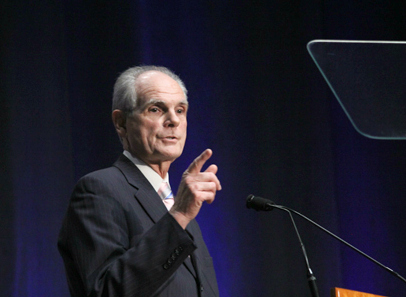Originally posted at CalBuzz.
By San Jose Mayor Chuck Reed.
One of the main reasons our politics are so dysfunctional is that each side spends a ton of money on focus groups and polling to figure out how they can make their opponents look bad. Then, regardless of the facts, these same groups spend millions repeating those poll-tested charges, turning their opponent into some kind of villain. Solutions to fix the problem are rarely discussed, much less acted upon.
Mayors cannot afford to engage in the politics of dysfunction. Our constituents face real problems and it is our responsibility to come up with real solutions. We have a responsibility to keep our citizens safe, to ensure our children get the education they need and to provide the essential services on which our residents rely. However, the skyrocketing cost of government employee retirement benefits is impairing our ability to meet these responsibilities.
Of equal concern to mayors is the fact that that growing pension costs are also having a major impact on our current government employees. As a growing percentage of our budgets goes toward pensions, cities have been forced to lay off loyal, effective workers and cut their salaries. If we are not able to get our retirement costs under control, the layoffs and the salary reductions will continue and the quality of the services that we provide our community, which includes our hard-working government employees, will continue to deteriorate.
That’s why I have joined a group of California mayors in authoring a pension reform initiative that would provide state and local governments with the tools necessary to control their unsustainable retirement costs.
Unfortunately, our opponents have decided to follow the dysfunction playbook: “deny, mischaracterize, and attack.”
First, they claim there is not a problem. Yet the largest pension system in California (CalPERS) recently indicated that California taxpayers will see their annual pension contributions jump by 50% over the next six or seven years. These increases will eat up the growth in revenues that we hope to see, further strain government budgets and services, and push more government agencies closer to the edge.
Even more shocking, many leaders of our government employee unions show little concern about the significant underfunding in our state pension systems. In particular, the Legislative Analyst’s Office has stated that the state teachers’ pension fund (CalSTRS) is currently scheduled to run out of funds in 30 years, meaning new teachers who are contributing their hard earned money into the system are at risk of not receiving their pensions when they retire. The situation keeps getting worse, and CalSTRS recently reported that its unfunded liabilities are growing at the astonishing rate of $22 million per day!
The problem deniers then claim the initiative “gives local elected officials the power to break their promises to public employees” and allows for “unilateral” changes to retirement benefits. Nothing could be further from the truth. The initiative specifically protects all benefits that are earned as work is performed, while simply allowing for changes to future benefits when circumstances dictate. Furthermore, any such changes must comply with applicable collective bargaining rules. Read exactly what is in the pension reform initiative
Finally, our opponents try to attack the initiative as some sort of right-wing conspiracy. Such nonsense ignores the facts that: four of our five proponents are Democratic leaders of Democratic-majority cities; polls consistently show that Democrats, Republicans and independents all support the need for pension reform; and the donations that we’ve received (which have only been for the initial policy work) have come from people across the political spectrum.
People support pension reform not because they are part of some ideological struggle. People of all political stripes support reform because they understand that this is simply a math problem with potentially disastrous consequences.
We have an obligation, to both our residents and our public servants, to fix this problem now before we see more cities, counties and government agencies slip into insolvency. The last thing we want is for our retired public servants to lose their accrued benefits when they are counting on them the most (as has happened in the bankrupt cities of Stockton, Central Falls, RI, and very possibly Detroit). This initiative provides the tools we need to ensure we can pay our employees the benefits they earn, without gutting essential services or placing unbearable burdens on our taxpayers.
The politics of dysfunction are easy. Finding real solutions to serious problems is hard. Let’s make this an example of how we can rise above the politics of dysfunction and achieve a fair and reasonable solution for the benefit of all Californians.
* * *
Chuck Reed is the mayor of San Jose. His article is a response to an op-ed from Steve Maviglio posted several weeks ago on CalBuzz.





